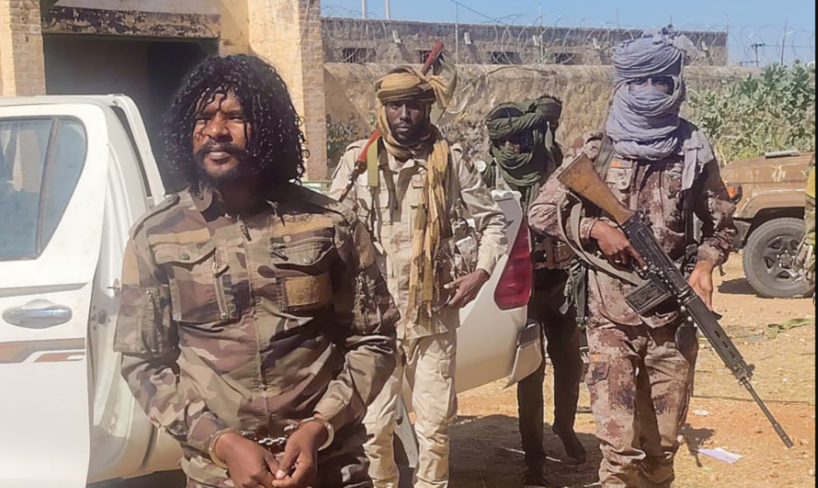RSF’s ‘Abu Lulu’ arrest branded a PR hoax amid El Fasher carnage
Sudan’s Rapid Support Forces face mounting criticism after announcing arrests over the El Fasher killings, with activists calling it a publicity ploy to deflect blame.
-

The Rapid Support Forces released a photo showing one of their own fighters, known as Abu Lulu (left,) being arrested in El Fasher. (Rapid Support Forces/AFP/Getty Images)
Sudan’s paramilitary Rapid Support Forces (RSF) announced the arrest of several fighters following public outrage over the scale of killings in El Fasher, but the move has been widely dismissed as a public-relations maneuver aimed at whitewashing atrocities committed against civilians.
Among those allegedly detained was Abu Lulu, an RSF commander featured in multiple videos showing fighters executing civilians during Sunday’s assault on El Fasher. RSF-affiliated outlets circulated footage of his arrest, portraying it as evidence of accountability.
“The detention of Abu Lulu appears to be a PR stunt to deflect global anger and shift attention away from the militia’s responsibility for this massacre,” said Mohamed Suliman, a Sudanese researcher and writer based in Boston. “However, many Sudanese did not buy into this and launched a hashtag: ‘You are all Abu Lulu’ – meaning the entire militia acts like him.”
Online, Sudanese users shared photos of senior RSF figures, including commander Mohammed Hamdan Dagalo, known as Hemedti, and his associates, each labeled “Abu Lulu” to symbolize collective responsibility for the killings.
Evidence links RSF leadership to attacks
Open-source investigators at the Center for Information Resilience confirmed that Hemedti’s brother and deputy, Abdul Rahim Dagalo, was present in El Fasher during the assaults.
Hala al-Karib, a Sudanese activist and regional director of the Strategic Initiative for Women in the Horn of Africa, dismissed the arrest as a “painful joke” designed to obscure the RSF’s role in the massacre.
“There is absence of accountability and indifference to our humanity,” she told The Guardian.
“Hundreds of thousands of Sudanese have perished daily, and young girls and women have been ruthlessly raped during the past three years. Still, all they do is try to silence our suffering.”
‘A mockery of justice’
Karib said the RSF could not credibly investigate its own crimes, given its origins in the Janjaweed militias responsible for the Darfur massacres two decades ago.
“The international community did not trust the Sudanese government during the transition to prosecute al-Bashir. You want us to give RSF/Janjaweed credibility? This is a mockery,” she said.
Shayna Lewis, a Sudan specialist at the advocacy group Preventing and Ending Mass Atrocities, said previous RSF pledges to investigate human rights abuses had “consistently failed to deliver justice.”
“This tactic by the RSF is a diversion,” she explained. “They’re attempting to show that the massacres on the ground are the work of a few rogue soldiers rather than a systematic policy of genocide, which we have seen since the very earliest days of the war, committed by the RSF, particularly in Darfur. These claims of accountability run hollow. It’s a farce.”
Atrocities in El Fasher
The UN human rights office reported that hundreds of civilians and unarmed fighters may have been killed while attempting to flee El Fasher. “Witnesses confirm RSF personnel selected women and girls and raped them at gunpoint,” said spokesperson Seif Magango in Geneva.
A survivor told a press conference organized by SIHA that RSF forces shelled neighborhoods and fired indiscriminately on civilians. “Some of my brothers were killed in front of me. I don’t know where my mother or father are, I don’t know where my little sister is,” he stressed. “There was another group of civilians behind us but they were taken by the RSF. They were tortured, whipped and vehicles rolled over them. The RSF are merciless.”
Hospitals, civilians targeted
The World Health Organization confirmed that at least 460 patients were killed during attacks on the Saudi maternity hospital in El Fasher. WHO spokesperson Christian Lindmeier said six healthcare workers were abducted and that soldiers returned “twice more and finished off what was still standing.”
According to the International Organization for Migration, more than 60,000 people fled El Fasher and its surroundings between October 26 and 29.
Meanwhile, Médecins Sans Frontières (MSF) warned of a humanitarian catastrophe as tens of thousands of displaced residents struggle to reach safety. “Reports from those who fled, as well as credible sources, indicate mass killings, indiscriminate violence, and ethnic targeting inside the city and on the roads to escape it,” MSF declared.
Giulia Chiopris, an MSF pediatrician in Tawila, said, “They are victims of torture, gunshots on the road, travelling by night. They were forced in El Fasher to eat animal feed, which has caused really bad abdominal problems, especially in children. Our surgical teams are working non-stop.”
In a similar vein, activists and civil society groups continue to warn that the violence and forced displacement in North Darfur are pushing the region to the brink of total humanitarian collapse.
Read more: Sudan: Satellite images reveal atrocities after El Fasher siege

 5 Min Read
5 Min Read








